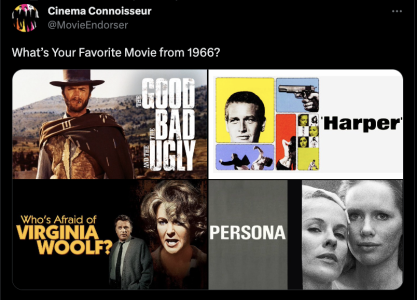I posted a Best of ’66 summary five years ago, but it can’t hurt to go again as I’ve shuffled things around and added a few.
In order of preference or greatness or historical importance, or a combination of all three…plus the not-bads and worst.
Top 15: 1. Michelangelo Antonioni‘s Blow-Up (aka Blowup); 2. Richard Brooks‘ The Professionals; 3. Fred Zinneman‘s A Man For All Seasons; 4. Robert Wise‘s The Sand Pebbles; 5. Robert Bresson‘s Au Hasard Balthazar, 6. Roman Polanski‘s Cul-de-sac; 7. Ingmar Bergman‘s Persona, 8. Bernard Girard‘s Dead Heat on a Merry-Go-Round; 9. Woody Allen‘s What’s Up, Tiger Lily?; 10. Arthur Penn‘s The Chase; 11. Mike Nichols‘ Who’s Afraid of Virginia Woolf?; 12. John Frankenheimer‘s Grand Prix, 13. Lewis Gilbert‘s Alfie, 14. Frankenheimer’s Seconds; 15. Jack Smight‘s Harper.
16. Milos Forman‘s Loves of a Blonde; 17. Billy Wilder‘s The Fortune Cookie, 18. Norman Jewison‘s The Russians Are Coming, the Russians Are Coming, 19. Claude Lelouch‘s A Man and a Woman, 20. Gillo Pontecorvo‘s The Battle of Algiers, 21. Richard Lester‘s A Funny Thing Happened on the Way to the Forum, 22. Pier Paolo Pasolini‘s The Gospel According to St. Matthew, 23. Karel Reisz‘s Morgan!: A Suitable Case for Treatment.; 24. Blake Edwards‘ What Did You Do in the War, Daddy?; 25. Jack Smight‘s Kaleidoscope.

Fine, Decent, Tolerable, Not Bad: Funeral in Berlin; A Fine Madness; Walk, Don’t Run; How to Steal a Million; Torn Curtain; The Wild Angels; This Property Is Condemned; After the Fox; The Appaloosa; Alvarez Kelly; Georgy Girl; Not With My Wife, You Don’t; The Good, the Bad and the Ugly; The Quiller Memorandum; King of Hearts.
Worst of ’66: Hawaii, Murderers’ Row; Frankie and Johnny, The Singing Nun, Modesty Blaise, The Fat Spy, A Big Hand for the Little Lady, Boy, Did I Get a Wrong Number!, The Glass Bottom Boat, Paradise, Hawaiian Style; Nevada Smith; Assault on a Queen; Munster, Go Home!; Stagecoach (remake), The Blue Max, Three on a Couch, Batman, The Idol, The Bible: In the Beginning…, Mister Buddwing; An American Dream; Texas Across The River; Follow Me, Boys!; Is Paris Burning?; Madame X.
To hear it from The Limey‘s Terry Valentine (i.e., Peter Fonda), 1966 was the only year in which “the ’60s” were fully in flower and possessed by transformative energy and imaginings. There were countless manifestations — spiritual, creative — and firecracker-like amazements occurring within and without all over town.
April ’66 saw the famous Time magazine cover that asked “Is God dead?”, which was used by Roman Polanski during the filming of Rosemary’s Baby a year later.
Things were really and truly happening in the rock music realm. Hell, all over. Eight years after Cary Grant’s adventurous lysergic acid pathfinding and a year after Peter Fonda and John Lennon, both tripping their brains out at a small gathering somewhere in Benedict Canyon, clashed over Fonda’s “I know what it’s like to be dead” rumination, second-wave cool cats were sailing into the mystic like never before, and the almost revolutionary heterosexual activity wasn’t to be believed.
May ‘66 saw the release of Bob Dylan‘s Blonde On Blonde (and the coughing heat pipes in “Visions of Johanna”) and Brian Wilson‘s Pet Sounds, and three months later Revolver, the Beatles’ “acid album” which turned out to be their nerviest and most leap-forwardy, was released.
And the notorious Sunset Strip curfew riots (“For What It’s Worth”) began to happen in late fall of that year.
Film community-wise all kinds of mildly trippy, tingly and portentous things were popping all over in ‘66. Stanley Kubrick was neck-deep into the filming of the mystical, earthquake-level sci-fi classic 2001: A Space Odyssey. Warren Beatty and Arthur Penn were shooting the equally important Bonnie and Clyde, a zeitgeist page-turner if there ever was one.
But you’d never guess what was happening to go by the mood, tone and between-the-lines repartee during the 39th Oscar Awards, which honored the best films of 1966 but aired in April ’67, or roughly seven weeks before the release of Sgt. Pepper. Bob Hope‘s opening monologue is punishing, almost physically painful to endure. And look…there’s Ginger Rogers!
